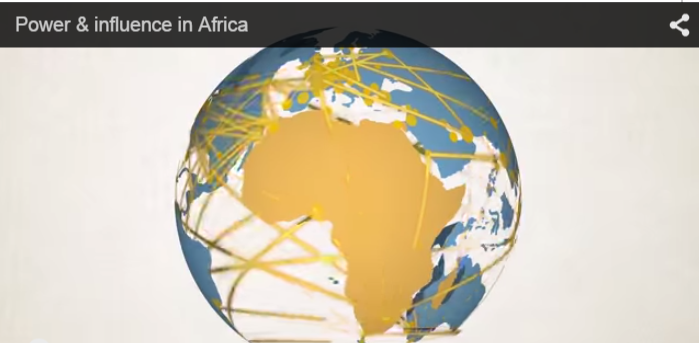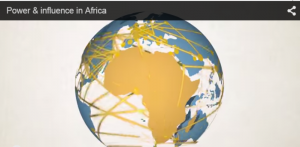A New Round of Predictions for Africa


[/media-credit] Pardee Center “Power and Influence in Africa” video, which uses predictive software to compare rising African states.
Africa Pulse notes that continent-wide, GDP growth will slow to four percent from an average of 4.5 percent in 2014. However, this is a slower decline than originally predicted, noting that commodity-based economies are not the “kiss of death” previously thought. Only two economies are predicted to contract over the next two years, according to International Monetary Fund reports. One, Sierra Leone, was hit hard by Ebola, and the other, Equatorial Guinea, almost solely relies on oil exports.
This comes as the International Center for Investigative Journalism (ICIJ) has put together a series of scathing reports on the misuse of World Bank funds across the world (including Africa), resulting in forced evacuations and displacements.
While many African economies are tied to oil prices, either through export or by transport for their commodities, those oil-importing nations such as Kenya, Senegal, and Cote d’Ivoire are expected to continue strong growth next year.
Nevertheless, the diversity of the continent’s economies is predicted to help some nations bounce back, especially as service and manufacturing sectors continue to grow. Nigeria, in particular, while a major oil-producing nation, is expected to see strong growth in 2016 according to the report. This is also most likely helped by their recent GDP rebase, prompting headlines like this one in The Economist: “How Nigeria’s Economy Grew by 89% Overnight.”
Ultimately, African GDP projections are difficult to make, according to the Center for Global Development, as many countries do not rebase their statistics over any consistent interval. Rebasing involves recalculating the prices of goods and services across all sectors. Most developed nations rebase annually, but this takes large surveys and complex statistics. Burundi, Ghana, Zambia, and the DRC have all rebased their economies in the past five years, and Kenya is due to rebase in June.
As economies grow, statistics get stronger and trends longer, predictions will get more accurate for Africa.
Economic and political power do not always go hand-in-hand, however. The Pardee Center for International Futures, part of the University of Denver, uses its own predictive algorithms to correlate across a series of inputs, including economic power and political power to draw conclusions on influence. Check out their long-term predictions for the African powerhouses below:

Kenya's economy is looking to grow over the next 10 years. Comparable to that of Nigeria.
The African continent will be the best emerging market of the century.
That will entirely depend on how the country will manage the 2017 general elections. If the resultant electioneering and the associated outcome will be acceptable to the competing parties, then Kenya will prosper.
Predictions are but just predictions. Today, more African countries are at peace with themselves. This is good for economic growth. However, previously fragile buts stabilizing economies (e.g. Burundi, South Sudan etc) are now relapsing to civil war. The current debate about another term for President Kagame in Rwanda, is also likely to cause jitters. In Uganda, the succession plan is also opaque. Boko Haram is wreaking havoc in parts of West Africa. Kenya's North Eastern and Coastal regions are bearing the brunt of Al Shabaab. The war in the Democratic Republic of Congo is also far from over. This is not the right cocktail for economic growth but doom.